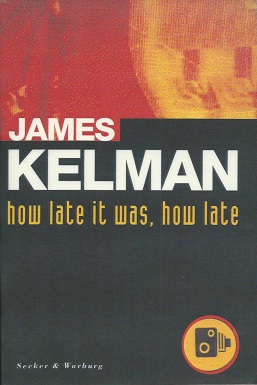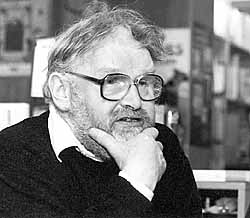The Glasgow dialect, also called Glaswegian, varies from Scottish English at one end of a bipolar linguistic continuum to the local dialect of West Central Scots at the other. Therefore, the speech of many Glaswegians can draw on a "continuum between fully localised and fully standardised". Additionally, the Glasgow dialect has Highland English and Hiberno-English influences owing to the speech of Highlanders and Irish people who migrated in large numbers to the Glasgow area in the 19th and early 20th centuries. While being named for Glasgow, the accent is typical for natives across the full Greater Glasgow area and associated counties such as Lanarkshire, Renfrewshire, Dunbartonshire and parts of Ayrshire, which formerly came under the single authority of Strathclyde. It is most common in working class people, which can lead to stigma from members of other classes or those outside Glasgow.

Sir Ian James Rankin is a Scottish crime writer and philanthropist, best known for his Inspector Rebus novels.
Tom Leonard was a Scottish poet, writer and critic. He was best known for his poems written in Glaswegian dialect, particularly his Six Glasgow Poems and The Six O'Clock News. His work frequently dealt with the relationship between language, class and culture.
Gilbert Adair was a Scottish novelist, poet, film critic, and journalist. He was critically most famous for the "fiendish" translation of Georges Perec's postmodern novel A Void, in which the letter e is not used, but was more widely known for the films adapted from his novels, including Love and Death on Long Island (1997) and The Dreamers (2003).

James Kelman is a Scottish novelist, short story writer, playwright and essayist. His fiction and short stories feature accounts of internal mental processes of usually, but not exclusively, working class narrators and their labyrinthine struggles with authority or social interactions, mostly set in his home city of Glasgow. Frequently employing stream of consciousness experimentation, Kelman's stories typically feature "an atmosphere of gnarling paranoia, imprisoned minimalism, the boredom of survival.".
Suhayl Saadi is a physician, author and dramatist based in Glasgow, Scotland. His varied literary output includes novels, short stories, anthologies of fiction, song lyrics, plays for stage and radio theatre, and wisdom pieces for The Dawn Patrol, the Sarah Kennedy show on BBC Radio 2. Saadi was born in Beverley to Pakistani parents in 1961.
Allan Johnstone Massie is a Scottish journalist, columnist, sports writer and novelist. He is a Fellow of the Royal Society of Literature. He has lived in the Scottish Borders for the last 25 years, and now lives in Selkirk.

How late it was, how late is a 1994 stream-of-consciousness novel written by Scottish writer James Kelman. The Glasgow-centred work is written in a working-class Scottish dialect, and follows Sammy, a shoplifter and ex-convict.

Duncan McLean is a Scottish novelist, short story writer, playwright, and editor.

Alasdair James Gray was a Scottish writer and artist. His first novel, Lanark (1981), is seen as a landmark of Scottish fiction. He published novels, short stories, plays, poetry and translations, and wrote on politics and the history of English and Scots literature. His works of fiction combine realism, fantasy, and science fiction with the use of his own typography and illustrations, and won several awards.

Kieron Smith, Boy is a novel by the Scottish writer James Kelman published in 2008 by Hamish Hamilton.
Harry Ritchie is a Scottish writer and journalist. He is the author of six books, and numerous newspaper articles and book reviews.

Literature in modern Scotland is literature written in Scotland, or by Scottish writers, since the beginning of the twentieth century. It includes literature written in English, Scottish Gaelic and Scots in forms including poetry, novels, drama and the short story.

A Chancer is a novel by the Scottish writer James Kelman published in 1985 by Polygon Books. This novel is the first to be written by Kelman, but it was published after The Busconductor Hines (1984).

Scots-language literature is literature, including poetry, prose and drama, written in the Scots language in its many forms and derivatives. Middle Scots became the dominant language of Scotland in the late Middle Ages. The first surviving major text in Scots literature is John Barbour's Brus (1375). Some ballads may date back to the thirteenth century, but were not recorded until the eighteenth century. In the early fifteenth century Scots historical works included Andrew of Wyntoun's verse Orygynale Cronykil of Scotland and Blind Harry's The Wallace. Much Middle Scots literature was produced by makars, poets with links to the royal court, which included James I, who wrote the extended poem The Kingis Quair. Writers such as William Dunbar, Robert Henryson, Walter Kennedy and Gavin Douglas have been seen as creating a golden age in Scottish poetry. In the late fifteenth century, Scots prose also began to develop as a genre. The first complete surviving work is John Ireland's The Meroure of Wyssdome (1490). There were also prose translations of French books of chivalry that survive from the 1450s. The landmark work in the reign of James IV was Gavin Douglas's version of Virgil's Aeneid.
Edinburgh Unemployed Workers Centre, also called Broughton Unemployed Workers Centre or simply "The Centre", was an organisation set up by the local Labour Party in Edinburgh, Scotland, as a means of aiding the local unemployed find work in 1981.
George Blake (1893–1961) was a Scottish journalist, literary editor and novelist. His The Shipbuilders (1935) is considered a significant and influential effort to write about the Scottish industrial working class. "At a time when the idea of myth was current in the Scottish literary world and other writers were forging theirs out of the facts and spirit of rural life, Blake took the iron and grease and the pride of the skilled worker to create one for industrial Scotland." As a literary critic, he wrote a noted work against the Kailyard school of Scottish fiction; and is taken to have formulated a broad-based thesis as cultural critic of the "kailyard" representing the "same ongoing movement in Scottish culture" that leads to "a cheapening, evasive, stereotyped view of Scottish life." He was well known as a BBC radio broadcaster by the 1930s.

Scottish Mussel is a 2015 comedy film, written, directed and produced by Talulah Riley that revolves around the life of a Glaswegian criminal, Ritchie, who becomes interested in poaching freshwater pearl mussels from rivers in the Highlands of Scotland. During the course of his criminal enterprise, he falls in love with Beth, played by Riley, who is a conservationist from England.

Douglas Stuart is a Scottish-American writer and fashion designer. Born in Glasgow, Scotland, he studied at the Scottish College of Textiles and London's Royal College of Art, before moving at the age of 24 to New York City, where he built a successful career in fashion design, while also beginning to write. His debut novel, Shuggie Bain – which had initially been turned down by many publishers on both sides of the Atlantic – was awarded the 2020 Booker Prize. His second novel, Young Mungo, was published in April 2022.

Meantime is a 2022 crime fiction novel by the Scottish comedian Frankie Boyle. The story follows drug addict Felix McAveety's unfocused investigation into his friend Marina's death. It is set in Glasgow, Scotland, shortly after the 2014 independence referendum. Felix is aided by the crime fiction writer Jane, the left-wing activist Amy and his depressed neighbour Donnie. They meet Chong, who seems to believe reality is simulated, and find signs that British Intelligence are involved in Marina's death.












